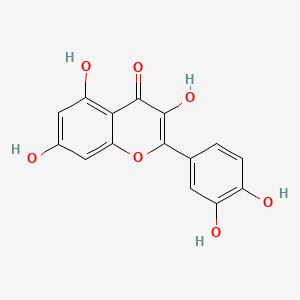quercetin
quercetin is a lipid of Polyketides (PK) class. Quercetin is associated with abnormalities such as Coronary heart disease, Myocardial Infarction, Cirrhosis, Coronary Arteriosclerosis and Vascular ring. The involved functions are known as Vasodilation, physiological aspects, Fermentation, Process and Ingredient. Quercetin often locates in Arterial system, Endothelium, Skin, Endothelium, Vascular and Tissue specimen. The associated genes with quercetin are P4HTM gene, SULT gene, UGT1A1 gene, ARHGAP26 gene and PLXNB1 gene. The related lipids are blood lipid, Promega, Steroids, Phosphatidylserines and Fatty Acids. The related experimental models are Knock-out, Mouse Model, Xenograft Model, Tissue Model and Cancer Model.
References related to lipids published in Toxicol. Sci.
| PMID | Journal | Published Date | Author | Title |
|---|---|---|---|---|
| 21622943 | Toxicol. Sci. | 2011 | Kumar R et al. | Citrinin-generated reactive oxygen species cause cell cycle arrest leading to apoptosis via the intrinsic mitochondrial pathway in mouse skin. |
| 16177238 | Toxicol. Sci. | 2005 | Zhang YM | Protective effect of quercetin on aroclor 1254-induced oxidative damage in cultured chicken spermatogonial cells. |
| 23811825 | Toxicol. Sci. | 2013 | Latronico T et al. | Impact of manganese neurotoxicity on MMP-9 production and superoxide dismutase activity in rat primary astrocytes. Effect of resveratrol and therapeutical implications for the treatment of CNS diseases. |
